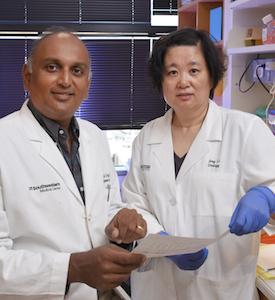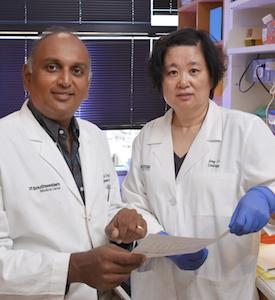
Credit: UT Southwestern
DALLAS – Aug. 8, 2017 – UT Southwestern Simmons Cancer Center researchers have shown that a first-in-class molecule can prevent breast cancer growth when traditional therapies stop working.
First-in-class drugs are drugs that work by a unique mechanism, in this case a molecule that targets a protein on the estrogen receptor of tumor cells. The potential drug offers hope for patients whose breast cancer has become resistant to traditional therapies.
"This is a fundamentally different, new class of agents for estrogen-receptor-positive breast cancer," said Dr. Ganesh Raj, Professor of Urology and Pharmacology at UT Southwestern's Harold C. Simmons Comprehensive Cancer Center."Its unique mechanism of action overcomes the limitations of current therapies."
All breast cancers are tested to determine if they require estrogen to grow and about 80 percent are found to be estrogen-sensitive. These cancers can often be effectively treated with hormone therapy, such as tamoxifen, but as many as a third of these cancers eventually become resistant. The new compound is a potential highly effective, next-line treatment for these patients, said Dr. Raj, part of UT Southwestern's Urologic Cancer Team.
Traditional hormonal drugs, such as tamoxifen, work by attaching to a molecule called the estrogen receptor in cancer cells, preventing estrogen from binding to the receptor, a necessary step for cancer cells to multiply. But the estrogen receptor can mutate and change its shape over time so that the treatment drug no longer fits neatly with the receptor. When this happens, the cancer cells start multiplying again.
"There has been intense interest in developing drugs that block the ability of the estrogen receptor – the prime target in most breast cancers – from interacting with the co-regulator proteins that cause a tumor's growth. Blocking such "protein-protein interactions" has been a dream of cancer researchers for decades. Dr. Raj and his colleagues have done the remarkable by discovering what could be the first in class of a therapeutic that realizes this dream," said Dr. David Mangelsdorf, Professor and Chairman of the Department of Pharmacology, who holds the Alfred G. Gilman Distinguished Chair in Pharmacology, and the Raymond and Ellen Willie Distinguished Chair in Molecular Neuropharmacology in Honor of Harold B. Crasilneck, Ph.D.
The drug works by blocking other molecules &ndash proteins called co-factors – that also must attach to the estrogen receptor for cancer cells to multiply. The new molecule, dubbed ERX-11, mimics a peptide, or protein building block. So far, it has been tested in mice and in cancer cells removed from patients and works well in both models, and there have been no signs of toxicity in the tests.
If successfully translated to a human therapy, another advantage of ERX-11 is that it could be taken orally by patients, rather than as an infusion. Dr. Raj said the group is hoping to get a clinical trial under way in about a year.
The notion of blocking protein co-factors has implications for treatment of other cancers as well. "This could be a first-line breast cancer therapy down the line. It could even lead to new treatments for other hormone-sensitive cancers. For now, it offers hope for women with estrogen-sensitive breast cancer for whom conventional therapies fail," Dr. Raj said.
The research appears in the online journal eLife.
###
Other UT Southwestern researchers who participated in the study are Dr. Shihong Ma, senior research associate; Dr. Rui Li, senior research associate; Dr. Xihui Liu, Instructor in Urology; Shino Murakami, graduate student researcher; Dr. Wan-Ru Lee, research scientist; Dr. Vijay Gonugunta, research scientist; and Dr. Douglas Strand, Assistant Professor in Urology.
Funding for the research was provided by the National Institutes of Health, the Cancer Prevention and Research Institute of Texas, Department of Defense, Congressionally Directed Medical Research Programs, the Welch Foundation and the Mimi and John Cole Foundation.
The Harold C. Simmons Comprehensive Cancer Center at UT Southwestern is the only NCI-designated Comprehensive Cancer Center in North Texas and one of just 48 NCI-designated Comprehensive Cancer Centers in the nation. The Harold C. Simmons Comprehensive Cancer Center is among only 30 U.S. cancer research centers to be designated by the National Cancer Institute as a National Clinical Trials Network Lead Academic Site.
About estrogen-sensitive breast cancer
What are estrogen-sensitive breast cancers
- About 80 percent of breast cancers are estrogen-receptor positive, called ER-positive, ER-sensitive, or sometimes HR-positive. This designation means the cancer requires estrogen to grow.
- Estrogen is a hormone primarily produced by the ovaries in premenopausal women and in other tissues, especially fat and skin, in postmenopausal women.
Why it matters
- About a third of ER-positive breast cancers eventually become resistant to traditional hormone therapy.
- Women with ER-positive breast cancer, which can be treated with hormone therapy, have a higher 5-year-survival rate than women with ER-negative breast cancer.
Who's more at risk
- Women who have taken hormone-replacement therapy for more than five years are at higher risk of developing ER-positive breast cancer.
- The percentage of breast cancers that are ER-positive increases with age.
Source: National Cancer Institute
Media Contact
Cathy Frisinger
[email protected]
214-648-3404
@UTSWNews
http://www.swmed.edu





